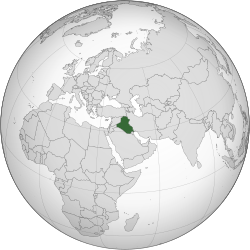 Location of Iraq (dark green) | |
| Medicinal | Illegal |
|---|---|
| Recreational | Illegal |
 Location of Iraq (dark green) | |
| Medicinal | Illegal |
|---|---|
| Recreational | Illegal |
Cannabis was allegedly introduced to Iraq in 1230 CE during the reign of Caliph Al-Mustansir Bi'llah by the entourage of Bahraini rulers visiting Iraq. [2] However, it was likely used by the people of Mesopotamia as early as the late Bronze Age.